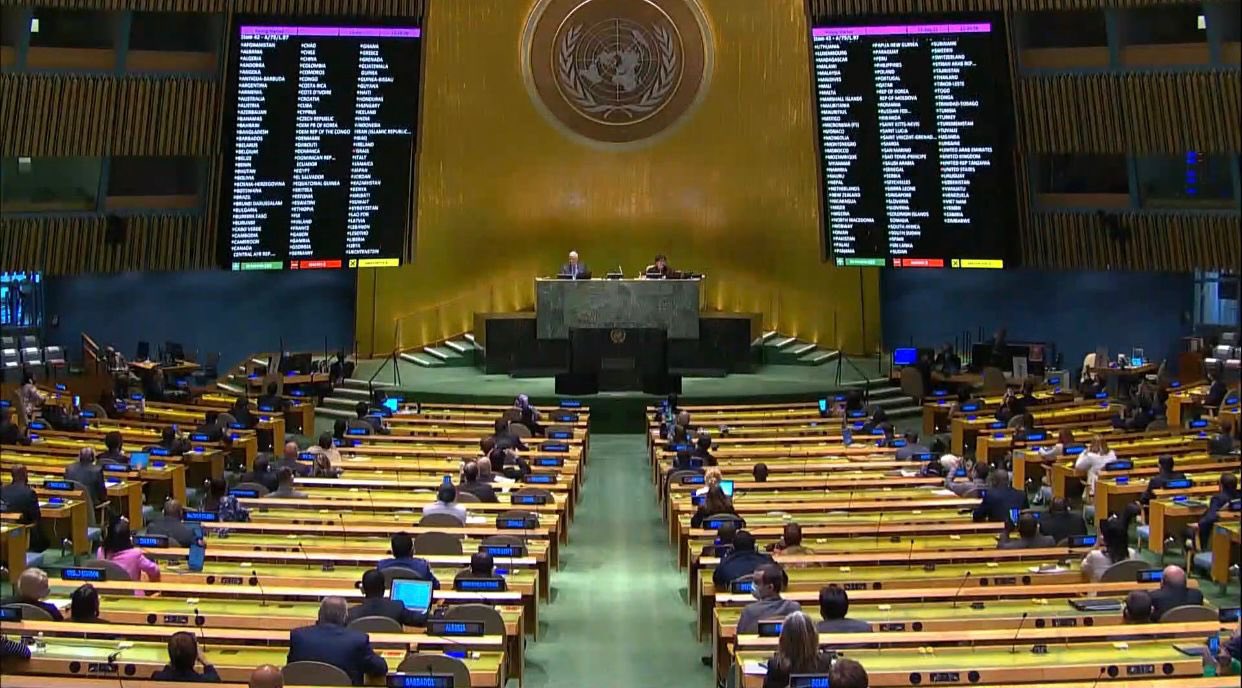The governments of the world demanded on Wednesday at the United Nations General Assembly, New York, for the 29th year in a row, the end of the economic blockade the United States has maintained on Cuba for over 60 years.
In this new session, the Foreign Minister of the Republic of Cube, Bruno Rodríguez, denounced at the UN the tightening of the U.S. blockade against his country amid the COVID-19 pandemic.
“Former President Donald Trump applied 243 unilateral coercive measures to curtail travels to Cuba and harm tourism third markets,” explained the Cuban foreign minister.
“Also, he adopted warlike measures to deprive the largest of the Antilles of access to fuel,” said Rodríguez.
“He also persecuted the health services provided by Cuba to other countries, increased harassment against financial transactions and threatened foreign investors and commercial institutions,” he added.
The head of the Cuban diplomacy asserted at the UN that, with unilateral coercive measures, Washington stopped the flow of remittances to Cuban families, seriously hit the self-employed sector and prevented the ties among Cuban nationals inside and out of the island.
“All these measures are in force and are being applied in practice, and paradoxically, they are shaping the behavior of Joe Biden’s current government in the months when Cuba is taking the heaviest blows of the COVID-19 pandemic,” warned the Cuban foreign minister.
Likewise, he said that a very large majority of U.S. citizens supports the lifting of the blockade, and those Cubans living in the United States wish for normal relations and the wellbeing of their families.
“Only a few elites have different electoral ambitions,” he said.
NAM, ASEAN, G77+China and CARICOM reject blockade against Cuba
At the UN meeting, the Non-Aligned Movement (NAM) strongly rejected unilateral coercive measures opposing international law, violating human rights and the Cuban people’s right to development.
Likewise, NAM condemned the extraterritorial nature of a blockade that affects third-party countries and prevents commercial and financial relations with Cuba.
“The United States must take the necessary steps to reverse the measures against the Caribbean island,” said the Permanent Representative of Azerbaijan to the UN, Yashar Aliyev, on behalf of the Non-Aligned Movement, and reaffirmed the organization’s commitment to multilateralism, sovereignty and the self-determination of the peoples.
In addition, Singapore’s representative, on behalf of the Association of Southeast Asian Nations (ASEAN), demanded the lifting of unilateral coercive measures.
ASEAN called for a constructive dialogue to end the blockade and reaffirmed its support for the resolution project introduced today, a document similar to the one that has been systematically approved by an overwhelming majority of the UN member states.
Furthermore, the Group of 77 and China praised the example set by Cuba in the fight against the COVID-19 pandemic and its solidarity with other nations of the world.
The G77+China reiterated its call for the end of the U.S. economic, commercial and financial blockade, which it described as the main obstacle for the development of the Caribbean island.
On behalf of the Caribbean Community (CARICOM), Haiti’s Permanent Representative to the UN, Antonio Rodrigue, recalled that the measures imposed by Washington on Havana 60 years ago are rejected by the international community and public opinion, and demanded the lifting of these measures as a response to a legitimate concern of the CARICOM member countries.
The Haitian permanent representative to the UN also expressed their constant concern about the negative impact of this policy as it constitutes a flagrant violation of the principles and purposes of the Charted of the United Nations and international law, which defend the sovereignty of states, the non-intervention in their domestic affairs and their people’s right to self-determination.
Blockade against Cuba violates international law
In that same vein, the Representative of the Russian Federation to the UN, Vasyli Nebenzia, said that the war of sanctions unleashed by the United States to eliminate a government it dislikes is a clear example of its aggressive foreign policy.
Likewise, Nebenzia warned that at the current time, when the world is facing COVID-19, the countries should drop sanctions and economic war to join efforts in the battle against a pandemic and when so much solidarity is required.
In his statement at the UN General Assembly, China’s Ambassador to the UN, Zhang Jun, insisted that the economic, commercial and financial blockade prevents Cuba from moving forward with the Sustainable Development Goals (SDGs) and opposes the principles and purposes of the UN Charter.
China especially condemned that the White House is making efforts to harden its stance, and, as a consequence, hinder the access to medicines and necessary supplies to face the COVID-19 pandemic in the Caribbean island, and urged Washington to improve its ties with Havana as it is in the interest of the two countries and peoples and it will benefit the peace and stability in the Americas.
For the 29th year in a row, the UN General Assembly adopted a new resolution with the support of 184 countries that demand the end of the U.S. economic, commercial and financial blockade imposed against Cuba.
During the vote at the UN General Assembly, three countries abstained, and only two voted against the resolution: The United States and Israel, which were isolated by the demand of the majority of the international community.
Since 1992, the UN has supported the resolution demanding the end of the blockade imposed by Washington 62 years ago, but the U.S. administration continues ignoring the countries and insisting on its hostile policy.



